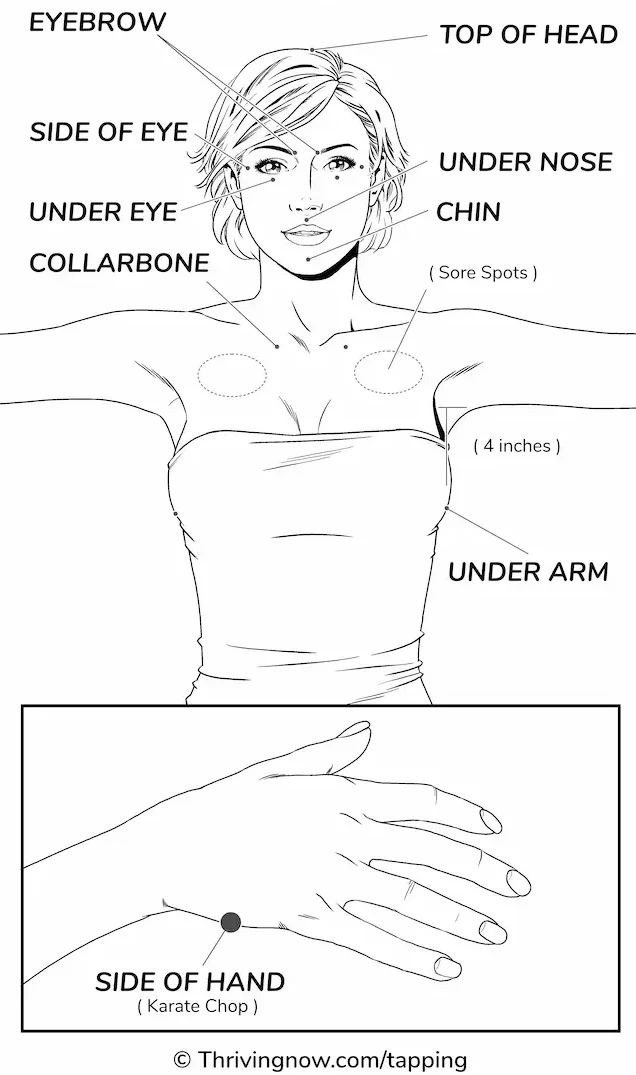
Emotional Freedom Techniques (EFT) tapping, is a practice blending the ancient wisdom of Chinese Medicine with modern psychology to heal emotional wounds. This article offers hope for overcoming stress & trauma and navigating life changes. By addressing common life challenges and debunking misconceptions, it guides readers towards emotional well-being. Through scientific evidence, case studies, and a step-by-step guide, it empowers individuals to embrace EFT tapping as a tool for inner strength and healing.
- Introduction: Exploring the World of EFT Tapping
- Navigating Common Life Challenges
- Introducing EFT Tapping: A Holistic Approach to Emotional Wellbeing
- Dispelling Myths About EFT Tapping and Emotional Healing
- Understanding the Core Principles of EFT Tapping
- The Science Behind EFT Tapping
- Illustrating the Effectiveness of EFT Tapping
- Step-by-Step Guide: The EFT Tapping Process
- Different Approaches to Practicing EFT Tapping and the Benefits of Working with a Practitioner
- Conclusion
Introduction: Exploring the World of EFT Tapping
Emotional Freedom Techniques, or EFT tapping, is a transformative practice designed to soothe the mind and heal the heart. It combines ancient wisdom with modern psychology to help us overcome emotional struggles such as stress, trauma, life changes, and the complex emotions that come through adversity or an illness diagnosis.
EFT tapping goes beyond being just a technique. It’s like having a supportive friend who can navigate through difficult times with you. This practice has gained popularity as a way to improve emotional well-being and build resilience in various situations. Whether you’re looking for stress relief or working through deep-rooted trauma, EFT tapping offers hope and support.
Note: Imagine having a tool at your fingertips—quite literally—that empowers you to unlock your innate capacity for emotional healing. As we delve deeper into the heart of common life challenges, consider EFT tapping as your promising solution toward finding balance and peace within.
Navigating Common Life Challenges
Life’s journey, though often beautiful, is filled with highs and lows. We all encounter emotional hardships along the way that can disrupt our mental well-being. Let’s delve deeper into these common challenges to better understand them:
Stress at Work
Work-related stress is a prevalent issue that stems from factors such as an excessive workload, approaching deadlines, or strained relationships among colleagues. If left unchecked, it can escalate into burnout, taking a toll on both your professional performance and personal life.
Workplace Stress Triggers:
- Heavy Workload: A persistently overwhelming volume of work can make meeting deadlines seem unconquerable while maintaining quality work.
- Unhealthy Relationships: Disputes or tension with colleagues or superiors can lead to a toxic workspace that increases stress.
- Lack of Job Security: In times of economic instability, the apprehension about job loss can induce chronic stress.

With EFT tapping, you can manage workplace stress effectively and enhance your productivity.
Anxiety About the Future
The uncertainty of what tomorrow holds can evoke feelings of anxiety. This could involve concerns about financial stability, health issues, or fear of major life changes such as relocating or ending a relationship.
Common Causes of Future Anxiety:
- Financial Security: Worrying about maintaining a stable income and fulfilling financial commitments can trigger anxiety.
- Major Life Changes: Significant transitions like moving cities, switching careers, or ending a relationship often bring along uncertainty that can fuel anxiety.
- Health Worries: Apprehension about potential health issues, for yourself or loved ones, also contribute to anxiety about the future.

Applying EFT tapping techniques can help alleviate health anxieties and instil a sense of calm.
Traumatic Experiences from the Past
Past traumatic experiences can cast a long shadow, affecting emotional well-being even long after the event. These could range from personal traumas like accidents or loss to larger-scale incidents such as natural disasters or societal disruptions.
Types of Trauma:
- Personal Trauma: This includes events that directly impact you, like accidents, loss of a loved one, or suffering prolonged bullying at school. Other examples include:
- Physical Abuse – This type of trauma can come from violent acts such as domestic violence, physical assault or child abuse.
- Emotional Abuse – This form of trauma can stem from psychological manipulation, constant criticism, or abandonment.

- Community Trauma: Incidents such as a pandemic, war, or mass violence that affect entire communities can leave a lasting traumatic impact.
- Historical or Generational Trauma: This pertains to collective trauma endured by groups across generations, often due to systemic oppression or violence.
Remember, regardless of what life challenge you are currently facing, it's important to acknowledge them and understand that feeling overwhelmed is a normal response. The key is not to face these challenges alone. There are effective coping mechanisms and support systems available.
Roadblocks in Achieving Personal Goals
Roadblocks can manifest in various forms, often rooted in underlying emotional factors. Here are a few ways these roadblocks might present themselves:
- Fear of Failure: This emotional obstacle may hold you back from chasing your dreams due to feelings of inadequacy or the fear of judgment from others.
- Self-Doubt: Rooted in past experiences of criticism or rejection, self-doubt can rob you of confidence, causing hesitation or undermining your own efforts when striving for your goals.

- Perfectionism: While striving for excellence is admirable, setting up for perfection may set unattainable standards, causing dissatisfaction and sabotaging your progress through relentless self-criticism and avoidance of challenges.
- Limiting Beliefs: Deeply ingrained beliefs about your capabilities or worthiness, often formed early in life, may prevent you from pursuing goals aligned with your true potential.
- Procrastination and Lack of Motivation: Symptoms of deeper emotional turmoil such as anxiety or depression may drain your energy and focus, creating a vicious cycle of frustration that limits your progress towards personal goals.
Addressing these emotional roadblocks often involves self-reflection and seeking support from trusted individuals or professionals.
Don't worry an EFT Practitioner can help you explore these areas and support you in reaching your goals.
Introducing EFT Tapping: A Holistic Approach to Emotional Wellbeing
One method to navigate life’s challenges is EFT tapping. It’s designed to address various emotional issues by gently tapping on specific meridian points on the body.
Here are some key areas where EFT tapping can make a difference:
Stress Relief
Stress is a common part of life, but it doesn’t have to consume us. EFT tapping helps release tension and promote relaxation. This can lead to a significant reduction in stress levels.
Anxiety Management
Anxiety can feel like an ongoing battle, but there is hope for relief. Through EFT tapping, you can explore the root causes of your anxiety and work towards minimizing their impact on your daily life.
Trauma Healing
Dealing with past traumas can be incredibly challenging, but it’s essential for moving forward. EFT tapping provides a gentle approach to confront these emotional wounds, allowing for healing and growth.
Navigating Life Changes
Change can be both exciting and overwhelming. Whether you’re going through a major transition like starting a new job or facing smaller changes in your routine, EFT tapping can provide support and help you navigate these shifts with greater ease.
In summary, EFT tapping offers a holistic solution for common emotional challenges. It’s like having a readily available self-help toolkit that you can use anytime, anywhere. While it may seem too good to be true, this technique is grounded in proven principles and practices.
Misconception: EFT tapping sounds strange. Can it really make a difference?
In the next section, we’ll address some common misconceptions about EFT tapping and shed light on why it’s worth exploring as a powerful tool for emotional well-being.
Dispelling Myths About EFT Tapping and Emotional Healing
When you start exploring Emotional Freedom Techniques and Emotional Healing, it’s important to clear up any misunderstandings. Let’s uncover the truth by addressing these misconceptions directly.
Myth 1: EFT Tapping Isn't Backed by Science
Some people think that EFT tapping is a placebo and that it doesn’t have any scientific evidence supporting it. But that’s not true! Here’s why:
- Clinical Studies: More than 100 scientific studies have shown that EFT is effective in reducing symptoms of stress, anxiety, depression, and PTSD.
- Physical Changes: Research has also found that EFT can lead to positive changes in our body, like reducing stress hormones and improving heart rate variability.

Myth 2: Asking for Emotional Support Is a Sign of Weakness
Somehow, we’ve come to believe that seeking emotional support is a weakness or an admission of defeat. But the truth is:
- Dealing with Everyday Stress: We all face daily challenges like work pressure, family issues, or health concerns. Having tools like EFT tapping can help us manage our emotions better in these situations.
- Taking Care of Ourselves: Instead of waiting for a crisis to hit, taking proactive steps towards our well-being is a sign of strength. Engaging in practices like EFT can build resilience and improve our overall mental health.
Myth 3: Emotional Wellness Is Only for Those Who Are Struggling
There’s a misconception that emotional wellness practices are only meant for people going through tough times. But the reality is different:
- Improving Daily Life: Integrating EFT into our everyday routine can bring more clarity, focus, and happiness even when things are going well.
- Connecting Mind and Body: Our emotional well-being is closely linked to our physical health. By addressing our emotions through techniques like EFT, we can experience better overall wellness.
By letting go of these myths, we give ourselves the opportunity to fully embrace the power of EFT tapping. It’s not just a tool for solving problems—it’s a way to nurture our emotional well-being and tap into our own inner strength.
In the next section, we’ll explore the fundamental principles that make EFT tapping such a valuable resource for finding peace amid life’s challenges.
Understanding the Core Principles of EFT Tapping
EFT tapping, also known as Emotional Freedom Techniques, is a unique blend of ancient Eastern practices and contemporary Western psychotherapy. It brings together elements of acupressure with modern talk therapy to create a holistic approach to emotional healing.
The Importance of Meridian Points in EFT
At the heart of EFT tapping are the meridian points. These points are areas along the body’s energy pathways where negative emotions, thoughts and physical pain tend to gather. By tapping on these points, one can release blocked energy and stimulate healing.
Each point corresponds to different organs and emotions, making them crucial to the EFT tapping mechanisms for releasing emotional blockages.

Harnessing the Mind-Body Connection in EFT Therapy
Another foundational principle of EFT is its recognition and utilization of the mind-body connection. In this regard, it echoes many traditional healing systems which have long recognized that our thoughts and emotions can influence our physical health.
In EFT therapy, this connection is harnessed through a combination of focusing on a specific emotion or issue while simultaneously tapping on various meridian points. This dual focus helps to integrate physical sensation with emotional experience, leading to profound shifts in both mind and body.
In sum, EFT tapping blends physical tapping on meridian points with cognitive awareness and verbal affirmations for a comprehensive approach to emotional healing. And while these core principles may seem simple, their combined effect can lead to profound shifts in emotional well-being.
The Science Behind EFT Tapping
EFT tapping is a technique that combines ancient Chinese acupressure with modern psychology. It has caught the attention of many scholars and researchers. In this section, we will explore the scientific evidence that supports its effectiveness.
EFT Tapping's Potential in Reducing Anxiety
One area where EFT tapping has shown promise is in reducing anxiety levels. A study published in the International Journal for Psychology and Social Sciences revealed that participants experienced a significant decrease in anxiety after undergoing EFT tapping sessions [1]. The study concluded:
"The results support the potential of EFT as a cost-effective intervention to reduce anxiety and thereby help improve quality of life”
EFT Tapping as a Treatment for PTSD
Another application of EFT tapping is in the treatment of Post Traumatic Stress Disorder (PTSD). A clinical trial involving war veterans showed that following six EFT sessions, 86% of them no longer met PTSD criteria. Further studies concluded that a series of 4–10 EFT sessions is an efficacious treatment for PTSD [2]. The study highlighted:
"The results are consistent with that of other published reports showing EFT’s efficacy in treating PTSD and co-morbid conditions."
Effective Stress Relief and Emotional Healing
Stress relief is another area where EFT tapping has proven effective. Research conducted in the Journal of Nervous and Mental Disease shows that cortisol levels (a stress hormone) were significantly reduced after one hour of EFT therapy [3]. The study reported:
"Salivary cortisol assays were performed immediately before, and thirty minutes after the intervention session. Significant decreases in cortisol levels were found..."
EFT’s influence on emotional healing is backed by scientific research as well. A study in the Journal of Evidence-Based Integrative Medicine suggests that EFT can significantly reduce depressive symptoms [4]. The study stated:
"Depression, among many conditions, appears to be significantly affected by EFT interventions."
Illustrating the Effectiveness of EFT Tapping
The journey of emotional healing often requires courage and an open mind, especially when exploring therapies like EFT tapping. Personal stories and case studies offer glimpses into the transformative power of this complementary therapy.
Stress Management
Healthcare professionals enduring relentless stress during the COVID-19 pandemic turned to EFT as a coping mechanism. The results spoke volumes—reduced stress levels and enhanced well-being, resonating with research that underscores the stress-diminishing effects of EFT.
Each point corresponds to different organs and emotions, making them crucial to the EFT tapping mechanisms for releasing emotional blockages.
Anxiety Relief
Take Sarah, whose crippling anxiety once dictated her life’s pace. After consistent EFT tapping sessions, she noticed a significant reduction in her panic attacks. Her story mirrors findings from numerous studies highlighting EFT’s efficacy in diminishing anxiety symptoms.
Trauma Recovery
Jane, a sexual abuse victim with PTSD, found her trauma manageable after discovering EFT tapping. Her anxiety and flashbacks decreased significantly after several sessions. She saw improvements in sleep and regained control over her life, reflecting numerous cases where sexual abuse victims eased PTSD symptoms through EFT tapping therapy.
EFT tapping success stories, backed by encouraging statistics, highlight the technique’s role in improving emotional health. Its global integration into mental health practices is a testament to its value. Many therapists now incorporate EFT into their holistic approach, with its efficacy evident not just in numbers, but also in transformed lives.
Case studies of EFT are increasingly common in psychological literature, underlining its credibility. As doubts are addressed and overcome, each shared story and study deepens our understanding of EFT’s benefits, fostering greater acceptance and application.
Step-by-Step Guide: The EFT Tapping Process
Embarking on your journey towards emotional healing with EFT tapping begins with understanding the process. This simple, yet powerful technique may be broken down into several manageable steps. Here’s how to do it:
- Identify the Issue: Pinpoint the emotional distress or physical pain you wish to address. Be as specific as possible; every detail matters.
- Rate Your Distress: On a scale of 1-10, rate your level of discomfort or distress related to the issue identified. This subjective assessment helps track progress and effectiveness.
- Craft Your Setup Statement: Create a phrase that acknowledges your problem and affirms self-acceptance despite the issue at hand. An example might be: “Even though I have this [problem], I deeply and completely accept myself.“
- Perform the Setup: Tap on the side of your hand (known as the karate chop point) while simultaneously repeating your setup statement three times.
5. Navigate Through the Sequence: Tap on each of the following meridian points about 5-7 times while repeating a reminder phrase related to your problem:
- Beginning of the eyebrow
- Side of the eye
- Under the eye
- Under the nose
- Chin
- Beginning of the collarbone
- Underarm

The beauty of EFT tapping lies in its simplicity. It is a tool that can be used anytime, anywhere, helping to release emotional blockages and promote healing. While mastering the steps may require practice, the benefits are worth the commitment.
Check this article for an in-depth step-by-step article on how to self-apply EFT Tapping.
Different Approaches to Practicing EFT Tapping and the Benefits of Working with a Practitioner
When it comes to Emotional Freedom Techniques (EFT) tapping, there isn’t a one-size-fits-all approach.
Different techniques and approaches can be utilized depending on the individual’s unique needs and circumstances.
Basic Self-Help Tapping Sequences
Typically, beginners start with basic tapping sequences. This process involves focusing on a specific emotional issue while tapping on the meridian points in order. It’s simple, straightforward, and an excellent starting point for anyone new to EFT who wants to use it as a self-help tool.
Specialized Professional Applications
EFT tapping also has specialized professional applications for different emotional issues, life transitions, and holistic cancer care. For example, there are specific personalized sequences for tackling anxiety or trauma, managing stress during major life changes, or supporting emotional wellness during cancer treatment.
Working with EFT practitioners offers numerous benefits. They provide professional guidance through these different techniques and help tailor the practice to your specific needs:
- Personalized Guidance: A practitioner can customize the tapping process to suit your individual emotional needs.
- Deeper Emotional Exploration: Working with an expert can help you uncover and address complex feelings and uncovering underlying issues that may be holding you back.
- Improved Healing Results: By leveraging their expertise, a practitioner can help you make significant progress towards building resilience.

"With the guidance of an EFT Practitioner, she was able to not only manage her immediate anxiety but also unearth deep-seated fears around failure that were contributing to her stress levels."
"The practitioner helped them manage the emotional stress of their diagnosis and treatment, leading to improved overall wellbeing."
These examples underscore the profound impact of EFT tapping, especially when guided by a trained professional. EFT Practitioners can provide the personalized support needed to unlock emotional healing and resilience effectively. They serve as a beacon of hope, guiding individuals through their unique emotional landscapes towards a brighter, healthier future.
Conclusion
Emotional healing with EFT offers hope for those dealing with life’s ups and downs. This guide has shown how EFT Tapping can lead to emotional well-being, providing relief from stress, healing from trauma, and even support for holistic cancer care. Throughout this guide, we’ve discovered:
- The power of EFT Tapping in helping us cope with common challenges in life.
- The importance of seeking support for our emotional well-being and debunking any misconceptions around it.
- How EFT Tapping works, connecting specific points on our body with our thoughts and emotions for a more holistic approach to healing.
- The scientific evidence supporting the effectiveness of EFT Tapping, further validating its place in mental health practices.
It is recommended that you consider incorporating EFT Tapping into your self-care routine. Whether you decide to explore this technique independently or with the guidance of a trained professional, there are numerous benefits to be gained.
View this as your opportunity to embrace EFT Tapping and make it a part of your life. May it open doors to profound emotional healing and unwavering strength.
P.S. Want to discover if EFT Tapping is right for you? Book a Complimentary Call or Session today.
References:
- https://eftuniverse.com/wp-content/uploads/2022/12/Effect-of-Emotional-Freedom-Technique-EFT-Tapping-on-Anxiety-and-Quality-of-Life.pdf
- https://www.sciencedirect.com/science/article/abs/pii/S1550830716301604
- https://pubmed.ncbi.nlm.nih.gov/22986277/
- https://www.ncbi.nlm.nih.gov/pmc/articles/PMC6381429/


